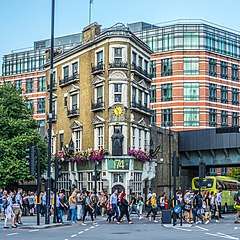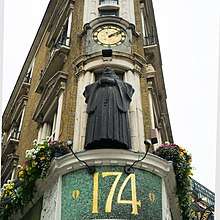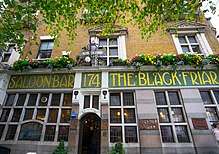The Black Friar (pub)
The Black Friar is a Grade II* listed[1] public house on Queen Victoria Street in Blackfriars, London.[2]
| The Black Friar | |
|---|---|
 The Black Friar | |
%26groups%3D_fe69d691eeeb1728e89ff56cf036a8645858df38.svg)
| |
| General information | |
| Architectural style | Arts and Crafts |
| Address | 174 Queen Victoria Street |
| Town or city | London, EC4 |
| Country | United Kingdom |
| Completed | 1905 |
| Design and construction | |
| Architect | Herbert Fuller-Clark |
| Other designers | Henry Poole (sculptor) |
| Designations | Grade II* listed[1] |
| Website | |
| www | |
It was built in about 1875 on the site of a former medieval Dominican friary,[3] and then remodelled in about 1905 by the architect Herbert Fuller-Clark. Much of the internal decoration was done by the sculptors Frederick T. Callcott & Henry Poole.[2]


The building was nearly demolished during a phase of redevelopment in the 1960s, until it was saved by a campaign spearheaded by poet Sir John Betjeman.[4] It is on the Campaign for Real Ale's National Inventory of Historic Pub Interiors.[5]
External links
References
| Wikimedia Commons has media related to The Black Friar public house (London). |
- Historic England. "Black Friar public house (1285723)". National Heritage List for England. Retrieved 26 September 2014.
- Jephcote, Geoff Brandwood & Jane (2008). London heritage pubs : an inside story. St. Albans: Campaign for Real Ale. pp. 28–30. ISBN 9781852492472.
- "Black Friar pub : London Remembers, Aiming to capture all memorials in London". Londonremembers.com. Retrieved 2018-03-27.
- "The Blackfriar | All London's Secrets Exposed". Discoveringsecretlondon.co.uk. Retrieved 2018-03-27.
- Brandwood, Geoff (2013). Britain's best real heritage pubs. St. Albans: CAMRA. p. 60. ISBN 9781852493042.
This article is issued from Wikipedia. The text is licensed under Creative Commons - Attribution - Sharealike. Additional terms may apply for the media files.